
ExpressVPN Summary
ExpressVPN is our top rated VPN service. The desktop and mobile applications are very easy to configure and use. ExpressVPN has VPN servers in 94 countries, the highest number of countries available across the VPNs we have tested. ExpressVPN is more expensive than the other VPNs we have tested, but we found the stable connection and consistent performance outweighed the increased cost. There is nothing more frustrating than dropped connections or buffering streaming media. One negative is the limit of 5 simultaneous devices, which is very low. This may not be enough devices if you use a VPN on each of your devices rather than configure a VPN on your network router.
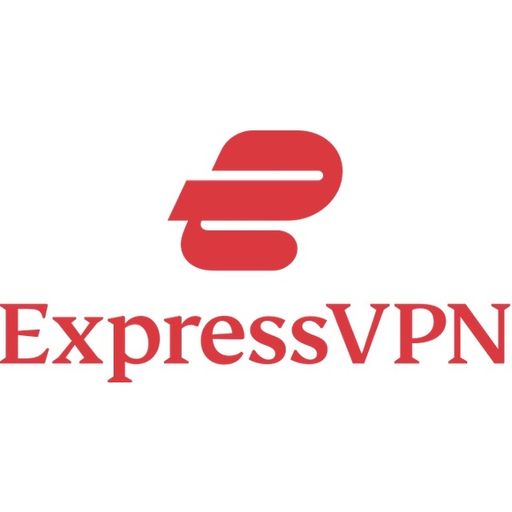
ExpressVPN is our favourite VPN for good reason. It offers a solid set of features, has one of the best performing VPN connections and supports a wide number of devices. It does cost more than most other VPN services, but we think that the additional cost is worth the extra investment.
- Has VPN servers in 94 countries, the highest we are aware of.
- Large number of supported devices.
- Simple and intuitive desktop and mobile applications.
- Consistent performance with minimal degradation when connecting to international VPN servers.
- Not the cheapest VPN service.
- Only supports 5 simultaneous devices which could be too low for many users.
- Dedicated IP address not available.
CyberGhost Summary
CyberGhost is one of best value VPN services we have tested, only beaten by ExpressVPN in features and performance if not in cost. We were impressed by the good device support they offer, including Apple TV, Android TV, gaming consoles and router support. Configuring our ASUS router was quick and simple using their well-written support articles. We did find the speeds to be slightly slower when connecting from our Sydney location to International VPN servers, but the slight reduction in bandwidth was not usually noticeable when browsing or streaming content.
You can optionally pay for a dedicated IP address, something most other VPN services do not provide. One negative is the limit of 7 simultaneous devices. This may not be enough if you use a VPN on each device rather than configure a VPN on your network router, something many ISP provided routers do not allow. Having to sign up to a 3 year plan is a bit cheeky. The money-back guarantee of 45 days is longer than all other VPNs we have tested, where 30 days seems to have become a standard.

CyberGhost is one of the best VPN services you can choose and have over 15 years of experience in offering VPN solutions, something evident in their solid features, wide device support and large geographic coverage. They were let down slightly in our performance testing, they only offer 7 simultaneous device connections, and you will need to sign up to the 3 year plan to get the best pricing. However, the money-back guarantee of 45 days is industry leading where 30 days seems to have become the standard.
- One of the lower cost VPN services available.
- 45 day money-back guarantee better than the 30 day offered by others.
- Has VPN servers in 90 countries.
- Include support for the WireGuard protocol.
- Dedicated IP address available as an option.
- Supports a wide range of devices compared to most other VPNs.
- Not as fast when testing compared to others, especially international VPN connections.
- 7 simultaneous devices may not be enough for some.
- You need to sign up to the 3 year plan to get the best pricing.
Introduction
Comparing VPN services is a somewhat tricky exercise. Most of the best VPN services offer pretty similar features, have comparable device support, and offer similar levels of performance and security. It is only if you have specific requirements for a VPN service, such as specific country support, device support or protocol support that you start to find clear winners and losers.
We will compare 2 of the best VPN services you can currently get, ExpressVPN and CyberGhost.
ExpressVPN
ExpressVPN is our top-rated VPN service. The desktop and mobile applications are very easy to configure and use. ExpressVPN has VPN servers in 94 countries, the highest number of countries available across the VPNs we have tested. However, ExpressVPN is more expensive than the other VPNs we have tested, but we found the stable connection and consistent performance outweighed the increased cost. There is nothing more frustrating than dropped connections or buffering streaming media.
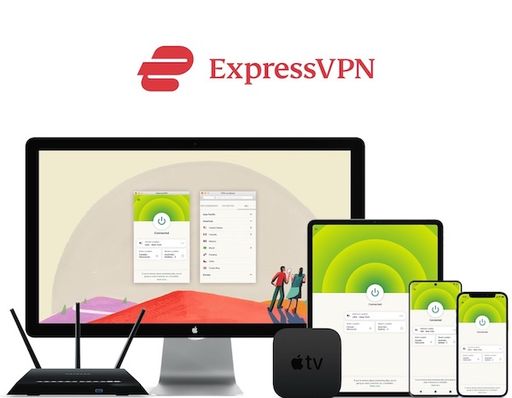
One negative is the limit of 5 simultaneous devices, which is very low. This may not be enough devices if you use a VPN on each of your devices rather than configure a VPN on your network router.
CyberGhost
CyberGhost is one of the best value VPN services we have tested, only beaten by ExpressVPN in features and performance if not in cost. We were impressed by the good device support they offer, including Apple TV, Android TV, gaming consoles and router support. Configuring our ASUS router was quick and simple using their well-written support articles. We did find the speeds to be slightly slower when connecting from our Sydney location to International VPN servers, but the slight reduction in bandwidth was not usually noticeable when browsing or streaming content. You can optionally pay for a dedicated IP address, something most other VPN services do not provide.
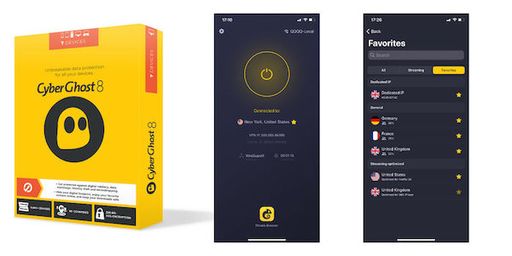
One negative is the limit of 7 simultaneous devices. This may not be enough if you use a VPN on each device rather than configure a VPN on your network router, something many ISP-provided routers do not allow. To get the best pricing, you have to sign up for a 3-year plan, which is a bit cheeky. The money-back-guarantee of 45 days is longer than all other VPNs we have tested, where 30 days seems to have become a standard.
Features
ExpressVPN and CyberGhost offer a very similar feature set. To be honest, most of the VPN services we have tested have the same basic set of features, so comparing features alone is not a great way of evaluating them.
VPN No-log Policy
A no-log policy is a mandatory feature of any VPN service. Even though all VPN services we test include a no-log policy, it is worth reading through the policy to ensure you are comfortable with the specific terms and conditions. You can follow the links to read the ExpressVPN and the CyberGhost no-log policies. They are well written and easy to follow and understand.
We found that both ExpressVPN and CyberGhost offer a comprehensive no-log policy.
VPN Split Tunnelling
Both ExpressVPN and CyberGhost offer split-tunnelling as standard. This is an important feature if you are not thinking of using the VPN for all of your Internet traffic. Perhaps you only want to use a VPN for specific streaming services such as the BBC iPlayer, with your daily web surfing not needing to use a VPN. In this case, a split tunnel can be configured to only pass the streaming traffic over the VPN with all other Internet traffic using your local ISP. This can ensure that your Internet is not adversely slowed down due to the VPN connection. It is sort of a best of both worlds approach, where you get to choose the level of security and privacy applied to specific types of Internet use.
Dedicated IP Address
ExpressVPN and CyberGhost use a shared IP address when they connect to the internet at a remote location. This is standard among most VPN services. CyberGhost does offer an optional dedicated IP address for an additional monthly fee. The jury is still out on if this is a worthwhile feature. Check out the differences between a shared and a dedicated IP address here. Note that as this was written by CyberGhost there is some inherent bias. Note that NordVPN includes a dedicated IP address for free as part of their standard plan. You can see how NordVPN compares to other VPN services, including ExpressVPN and CyberGhost in our Best VPN Service article.
Speed & Performance
Testing the speed and performance of a VPN is not always easy and straightforward. There are a number of factors that can impact the testing results, such as your local connection to your ISP, your ISP connections to the Internet, the VPN servers connection at the remote destination, and even the time of day the testing was performed.
ExpressVPN was an amazingly fast VPN service throughout our testing. We were surprised how little impact the VPN had on our download and upload bandwidth, and we were able to stream 4K video with little or no degradation in video performance. Whilst CyberGhost was not as fast in our testing, we also noticed little or no degradation in streaming video performance.
VPN Performance Testing
To test the speed and performance of a VPN service, we used a desktop iMac from our Sydney location and connected it to VPN locations in Sydney, London and San Francisco. We connect to the Internet using a 50Mbps download 20Mbps upload broadband connection. On a typical day without connecting to a VPN, we would typically get 54Mbps download and 19Mbps upload speed. The Speedtest results are shown below.
To determine an overall speed & performance rating, we performed general web searching and streaming from Netflix, BBC iPlayer and Disney+ over several weeks to ensure consistency. For all Speedtest results, we took a number of results over the testing period at different times of the day. We then chose the result that represented the average.
All testing was performed using the latest Mac version of the native VPN desktop app. Any specific settings are called out below.
Baseline Performance Testing
For the baseline testing, we connected from our Sydney location to servers in Sydney, London and San Francisco.
Sydney
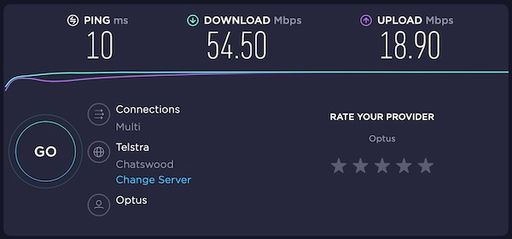
The results were pretty much as we expected based upon our 50Mbps download and 20Mbps upload broadband Internet connection. The low ping represents the close proximity of our Sydney location to the Sydney servers.
London
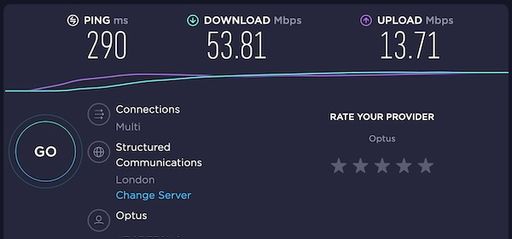
Both the download and upload bandwidth took a slight dip. The ping is noticeably larger due to the distance.
San Francisco
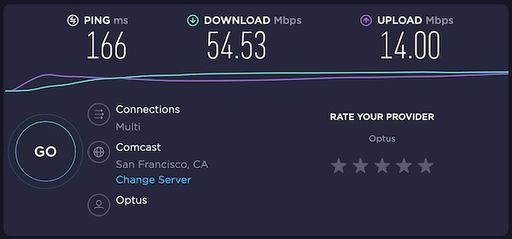
Both the download and upload bandwidth took a slight dip. The ping is larger due to the distance, but less than London. San Francisco is just over half the distance from Sydney as London is, so this seems a reasonable result.
ExpressVPN Performance Testing
For the ExpressVPN testing, we connected from our Sydney location to servers in Sydney, London and San Francisco. We enabled the Lightway protocol on the ExpressVPN desktop app, but all other settings were left as default. The VPN was connected to the location where we were performing the test, so if we were testing using London servers in Speedtest, we would also connect the VPN to the London ExpressVPN VPN servers. This represented a typical scenario where you may be connecting to London VPN servers to stream BBC iPlayer content that has been geo-restricted.
Sydney
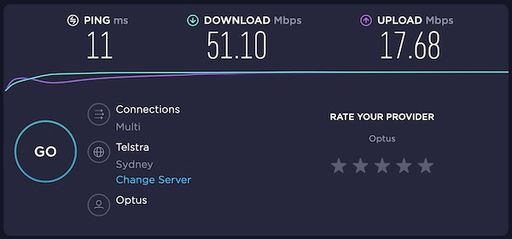
The results were pretty comparable with using no VPN and we did not notice any slowdown in connection performance. The connection remained very stable throughout testing, and we experienced no noticeable dropouts or disconnections. We actually felt that enabling the VPN 24 hours a day would not negatively impact our overall Internet experience.
London
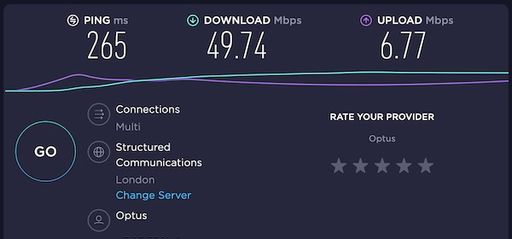
The results were pretty comparable with using no VPN and we did not notice any significant slowdowns in connection performance, with only the upload bandwidth being reduced. This became noticeable when our Mac started its regular cloud backup.
We also noticed that on many tests the ping time was even better than with no VPN! The average ping was only 265ms compared to a baseline of 290ms. This indicates that ExpressVPN is using a more efficient path to connect to London than our local ISP.
San Francisco
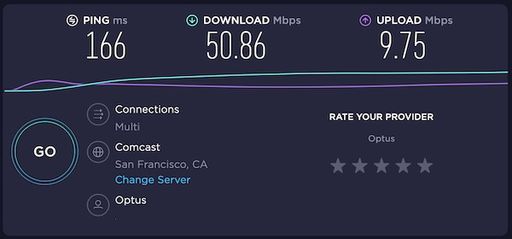
The results were pretty comparable with using no VPN and we did not notice any significant slowdown in connection performance, with only the upload bandwidth being reduced. This again became noticeable when our Mac started its regular cloud backup.
CyberGhost Performance Testing
For the CyberGhost testing, we connected from our Sydney location to servers in Sydney, London and San Francisco. We enabled the WireGuard protocol on the CyberGuard desktop app, but all other settings were left as default.
Sydney
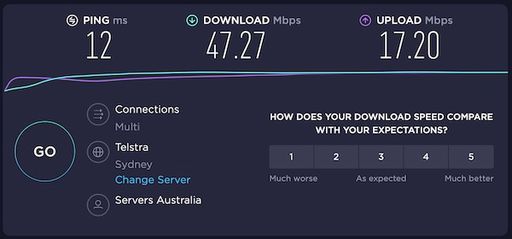
The results were pretty comparable with no using the VPN. As with ExpressVPN, we noticed no slowdown in streaming or Internet performance. The connection also remained very stable throughout testing when connected to Sydney VPN servers.
London
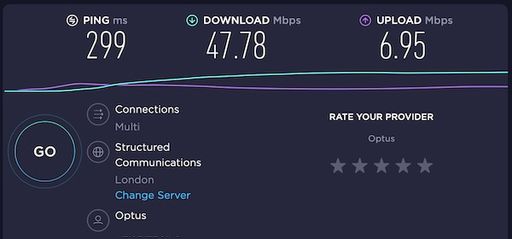
The results were mostly comparable with using no VPN and we did not notice any significant slowdown in connection performance. However, we did find the VPN connection less stable than ExpressVPN, so when streaming video there were more times where the video would pause and buffer. We also noticed a few disconnections. CyberGhost has an automatic kill switch which means that the Internet connection is paused when the VPN connection is lost. As with ExpressVPN, the upload speed was a lot lower. Even though the upload speed appears similar in Speedtest, we thought it felt slower and our backup speeds to the cloud were quite a bit lower than with ExpressVPN.
San Francisco
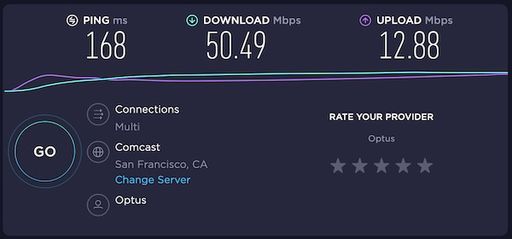
The results were mostly comparable with using no VPN and we did not notice any significant slowdown in connection performance. As with testing using the London servers, we found the streaming performance to not be as stable as ExpressVPN. Similar to London the upload speed was also reduced.
Security & Privacy
Both ExpressVPN and CyberGhost support the typical set of VPN protocols, including IKEv2, OpenVPN, L2TP, IPSec and PPTP. The only difference is that CyberGhost provides support for WireGuard.
ExpressVPN supports the Lightway protocol that was developed by ExpressVPN itself. We found that Lightway was faster than CyberGhost using WireGuard and recommend that you enable Lightway if you are using ExpressVPN.
Geographic Coverage
ExpressVPN covers 94 countries, with CyberGhost not far behind covering 90. This really only becomes a deciding factor if you live or wish to connect to those 4 countries. You can see a full list of supported countries on their respective websites.
We typically ignore the number of servers advertised. We have no way of knowing the capacity of the servers, so you cannot really determine that a higher number is actually better. Private Internet Access has over 33,000 servers, but we found the performance on par with others tested.
Device Support
ExpressVPN has a very impressive list of supported devices.
They both have the same support for desktop and mobile devices. This includes Mac, Windows, Linux, iPhone, iPad and Android devices.
They both support network routers. However, the support of routers is typically limited to specific manufactures and specific models. Therefore it is worth checking the website to confirm if your specific model is supported and to get a better understanding of how to configure it.
They both support Apple TV, Android TV, Amazon Fire TV and also typical Smart TV devices, such as Sony and Samsung. ExpressVPN additionally supports Roku.
They both support Microsoft Xbox and Sony Playstation gaming consoles, with ExpressVPN also supporting the Nintendo Switch.
They both have plugins for Google Chrome and Firefox, with ExpressVPN also supporting Microsoft Edge.
Simultaneous Devices
CyberGhost allows 7 simultaneous devices where ExpressVPN is limited to only 5. We think that even 7 could be too low with the number of connected devices we have today. There also does not appear to be a way of increasing this, so you will need to determine your current needs and also your projected needs, especially if you sign up for a multi-year plan.
Technical Support
We found ExpressVPN and CyberGhost to offer equal levels of support, both through the articles and tutorials on their website, and when we directly contacted their customer support.
Cost
If it all came down to cost then CyberGhost would be the clear winner. ExpressVPN is an expensive VPN service, and even if you prepay for a 12-month plan, it still works out 4 times the price of CyberGhost.
ExpressVPN
ExpressVPN is expensive and is the most expensive VPN we have tested. It does make up for its high cost somewhat by great device support and impressive performance, but we are not convinced it represents the best value for money.
ExpressVPN is cheaper if you subscribe to their 12-month plan, but you will need to prepay for the full 12 months. They do offer a 30-day money-back guarantee if you are not satisfied.
Note that ExpressVPN only supports billing in USD. We would have preferred to be shown the pricing and be able to pay in local currency.
- 1 Month USD 12.95
- 6 Months USD 9.99
- 12 Months USD 8.32
You can pay using a credit card, PayPal, Bitcoin, or from a number of less common payment options such as Klarna, Mint and UnionPay.
CyberGhost
CyberGhost is significantly cheaper than ExpressVPN, so if cost is a consideration, CyberGhost represents great value for money. If you are only prepared to sign up for 12 months, you are comparing USD 8.32 with ExpressVPN to only USD 3.99 with CyberGhost. If you are happy to sign up for longer, CyberGhost becomes even cheaper.
Unlike ExpressVPN, CyberGhost offers local currency billing.
They offer a 45-day money-back guarantee, slightly longer than the 30 days offered by ExpressVPN.
CyberGhost offers a significant discount if you subscribe to their annual plans. I am not a great fan of such discounting, as it basically forces you to take out multi-year plans as they represent a significant discount over paying month-to-month. I remember getting locked into a 5-year plan at another VPN provider to get their 90% discount.
- 1 Month USD 12.99
- 1 Year USD 3.99
- 2 Year USD 3.49
- 3 Year Plan 2.25 - also includes 3 free additional months
You can pay using a credit card, PayPal, Apple Pay, and Bitcoin.
Final Thoughts
It was hard to pick an overall winner. We rated ExpressVPN higher in our testing due to its fantastic features, superior performance and great device support. However, it is the most expensive VPN we have tested, and even if you subscribe to the annual plan it can work out significantly more expensive than others we tested. We think it can be worth the extra cost, but it is something you should seriously consider. CyberGhost can work out over 3 times cheaper than ExpressVPN and still provides a great VPN service.
We look forward to re-testing CyberGhost in the future. If they are able to improve the performance and stability using WireGuard and improve their device support further they will overtake ExpressVPN as our number 1 VPN service.
